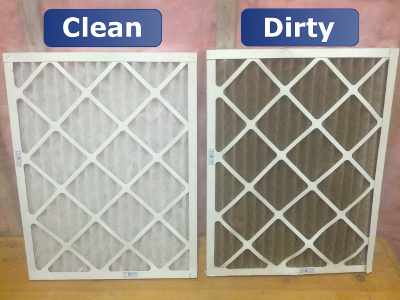Air Conditioning: What Tenants Need to Know
Change Those Filters!

AC filters must be changed on a regular basis.
Per your lease, the cost of the filters is the responsibility of the tenants and filters can be purchased at Walmart, Home Depot, Lowes etc. They are not expensive, and way less expensive than causing the system to fail.
In the case of the cheaper filters, this means switching them out once a month. Some of the more expensive filters can last up to three months and they will often also trap smaller particles that may cause allergies, etc.
Dirty Filters Use More Power!
When you fail to change the filters, three main things happen:
- The filter gets dirty and the AC ceases to work effectively.
- The entire system has to work harder in order to suck air through the dirty filter. This draws more power and may increase your electricity bill.
- Finally, the system can eventually exhaust itself and either freeze, or fail completely. A new AC system costs over $3000, so unless you want to replace it yourself, please, REPLACE THE FILTERS!
The Drain Pan
At the bottom of the filter area, there is a thin channel in the AC system called a drain pan, which is for condensation run-off. In this channel is a hole. You need to pour a quarter cup of bleach into this pan so that it goes down this hole, each month, or get bleach tablets for the tray (or you can use vinegar) to stop this drain-line from getting gunked up. Once it gets blocked, water will spill over and flood your unit (and the one below).
Look after your AC system and it will look after you!~
Air Flow
The distribution of air can present problems in many units, and is difficult to control. This is partly because the layout of the ducts and vents in a home is not always well designed. Also, the further away from the AC unit the vents get, the weaker the air flow becomes. And in lofts, because hot air rises, the air may be as much as 10 degrees warmer than downstairs. These are not simple problems to correct, and most homes suffer from this to a greater or lesser extent.
One technique to improve the situation, is to shut down, or decrease the vent flow in the rooms that get most of the air, or that are not used at all (eg. a spare room) which should increase the flow to the rooms which are too hot. This can make a big difference to your overall experience. So play around with the vents and get creative!~







